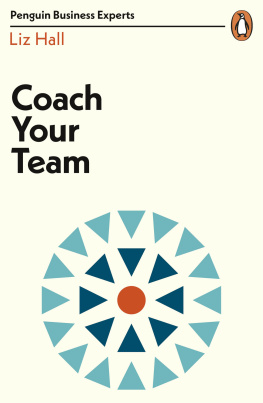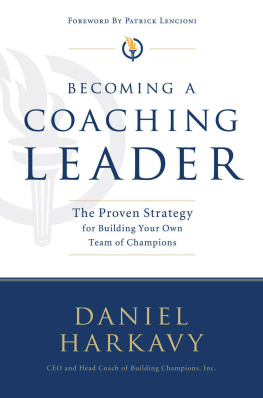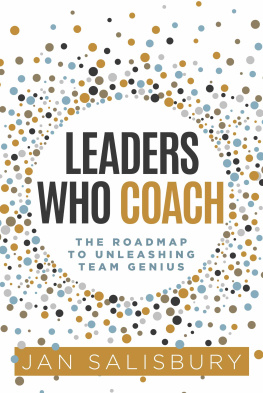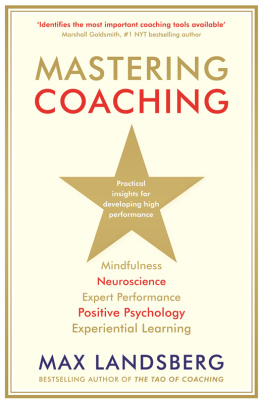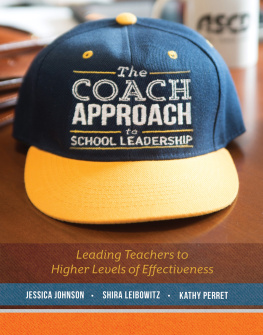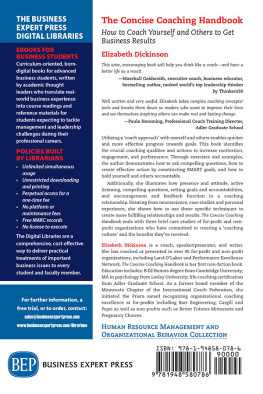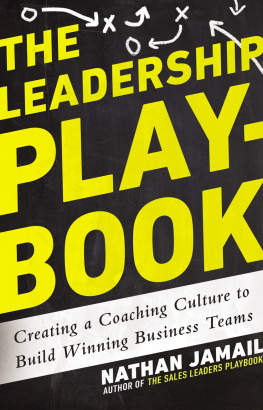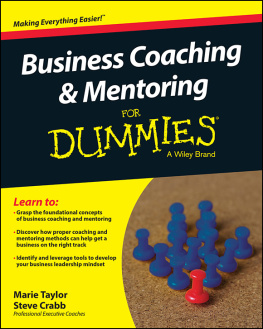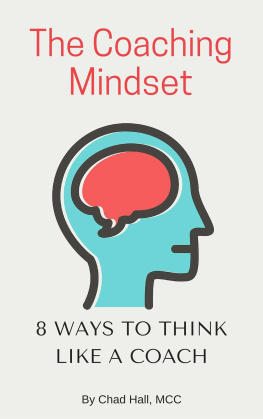About the Author
Liz Hall is an award-winning and internationally renowned accredited coach and journalist, and trained mindfulness teacher based between Spain and the UK. She has worked with a range of clients from organisations including Green Alliance, KPMG, CIPD, the NHS, News UK, Portsmouth University, and Reed Business Information. She is an expert on mindful coaching and regularly runs mindful coaching workshops in the UK and internationally. She has written for publications including the Guardian, the Financial Times and People Management and is the author of two other books, Mindful Coaching and Coaching in Times of Crisis and Transformation.
Liz Hall
COACH YOUR TEAM

PENGUIN BOOKS
UK | USA | Canada | Ireland | Australia
India | New Zealand | South Africa
Penguin Books is part of the Penguin Random House group of companies whose addresses can be found at global.penguinrandomhouse.com.

First published 2019
Copyright Liz Hall, 2019
The moral right of the author has been asserted
Text design by Richard Marston
ISBN: 978-0-241-39646-9
Follow us on LinkedIn: linkedin.com/company/penguinbusiness
This ebook is copyright material and must not be copied, reproduced, transferred, distributed, leased, licensed or publicly performed or used in any way except as specifically permitted in writing by the publishers, as allowed under the terms and conditions under which it was purchased or as strictly permitted by applicable copyright law. Any unauthorized distribution or use of this text may be a direct infringement of the authors and publishers rights and those responsible may be liable in law accordingly.
I dedicate this book with love and gratitude to my soulmate and husband, Ray. For everything, including your insightful input and support, which helped to keep me sane and to give shape to this book, particularly when I couldnt see the wood for the trees.
To my mindfulness teacher, Thay your deep wisdom, compassion and ability to bring mindfulness alive will stay with me always.
And to my late daemon dog Ziggy your loyalty, and your noble sweet gentle energy kept me company for fourteen years, including throughout the writing of this book.
List of Figures
List of Tables
Introduction
In 2014, Harvard Business Review ran an article on VUCA, the now ubiquitous acronym coined by the US military to describe volatile, uncertain, complex and ambiguous post-Cold War global conditions. The article highlighted how the acronym was fast becoming management shorthand for Its crazy out there! The world was indeed a little crazy then. Around this time, I co-wrote and edited a book about coaching in times of crisis and transformation, prompted in part by the fallout from the 2008 Global Economic Crisis. I remember wondering if the theme would continue to have a shelf life. It would be funny, if it wasnt so serious. The world seems to have become a whole lot crazier.
Were in the midst of a perfect storm of global challenges, including a worldwide crisis in mental well-being. Mental health issues, such as anxiety and depression, are taking an enormous toll on the economy, on individuals and those around them and on peoples abilities to contribute meaningfully to the organizations within which they work. In the UK alone, poor mental health is costing employers up to 42 billion a year in lost productivity,
There are many other urgent issues we face in the workplace and society, as leaders/managers and in our organizations. The list is vast. Climate change and related issues such as increasing numbers of refugees, food insecurity, and the threat of the Sixth Mass Extinction. Growing wealth disparity and the erosion of the middle class. Rising nationalism. Declining trust in institutions and leaders attendees at the World Economic Forum (WEF) in Davos in January 2019 underlined a widespread lack of faith (including in government). Bombardment with data, manipulation via social media platforms and a rise in human disconnection as technology becomes a common substitute for direct contact. Ethical concerns, disruption of business models, and an urgent need for reskilling coupled with widespread redundancy, as new technologies including Artificial Intelligence become widely adopted in the Fourth Industrial Revolution. And unless managed wisely, the significant transformations in global labour markets will increase already widening skills gaps, inequality and polarization, the WEF has warned.
Individually and collectively, faced with all these challenges, we need to wake up. We need new types of conversations. We need new collective narratives and practices about how we show up with one another, how we work together, how we lead, follow and manage others, about what it means to be human in these times.
Leaders and managers have a pivotal role to play in seeing off the old practices which no longer work for us, creating and putting in place alternatives that are more readily fit for purpose. We must create new processes that align around meaning, purpose and values and which draw on and foster courage, creativity, community, compassion and cooperation. Ones that honour the authenticity and diversity that movements such as #MeToo and #BlackLivesMatter have brought to our attention.
Many of us in our roles as leaders, managers and coaches, in our organizations and our lives in general are seeking change. Were searching for alternative ways of doing things and of being. Because, on some level, we know things cant carry on as they are. Its just not sustainable. The huge growth globally in coaching and the adoption of mindfulness in all sorts of areas including the workplace, education, and even politics are, in part, a response to the challenges we face.
It was a recognition that I couldnt continue as I was that led me to mindfulness, years before Id started working as a coach. It was a time when I was extremely stressed and worn down, a single mother, working very hard as a journalist ironically writing lots about well-being at work. (An irony not lost on me at the time, although I dont recall having the energy or desire to laugh at my situation!) I had a very young baby (now all grown up) who I was reluctantly taking to childcare, and I felt very torn. I never seemed to have enough time, energy or patience.
One day, driving home from the childminder, my daughter screaming, I snapped. I pulled over and I screamed too.
A woman tapped on the car window. Are you okay? Would you like to come in for a cup of tea?
Gulping back tears, and feeling ashamed, I nodded.
What a lovely woman! Ive often remembered her with deep gratitude. She reassured me she was a working mother of four that shed had her struggles too, on many an occasion.
After tea, biscuits and the love of a stranger, I drove home. And in floods of tears, I talked to a friend, who happened to be a nurse involved in counselling in general practice. She told me about an approach that was helping her. Although I didnt know it then, it was mindfulness. Not necessarily easy, but so simple. Using that approach, I began to get a glimpse of calmness every now and then, a sense of spaciousness on the odd occasion, a snatch of what it feels like to be in the present, rather than panicking about future deadlines, delivering on projects, how on earth I was going to get everything done, what an awful mother I was. I remember looking at a picture book with my daughter and noticing that, wow, I was actually

